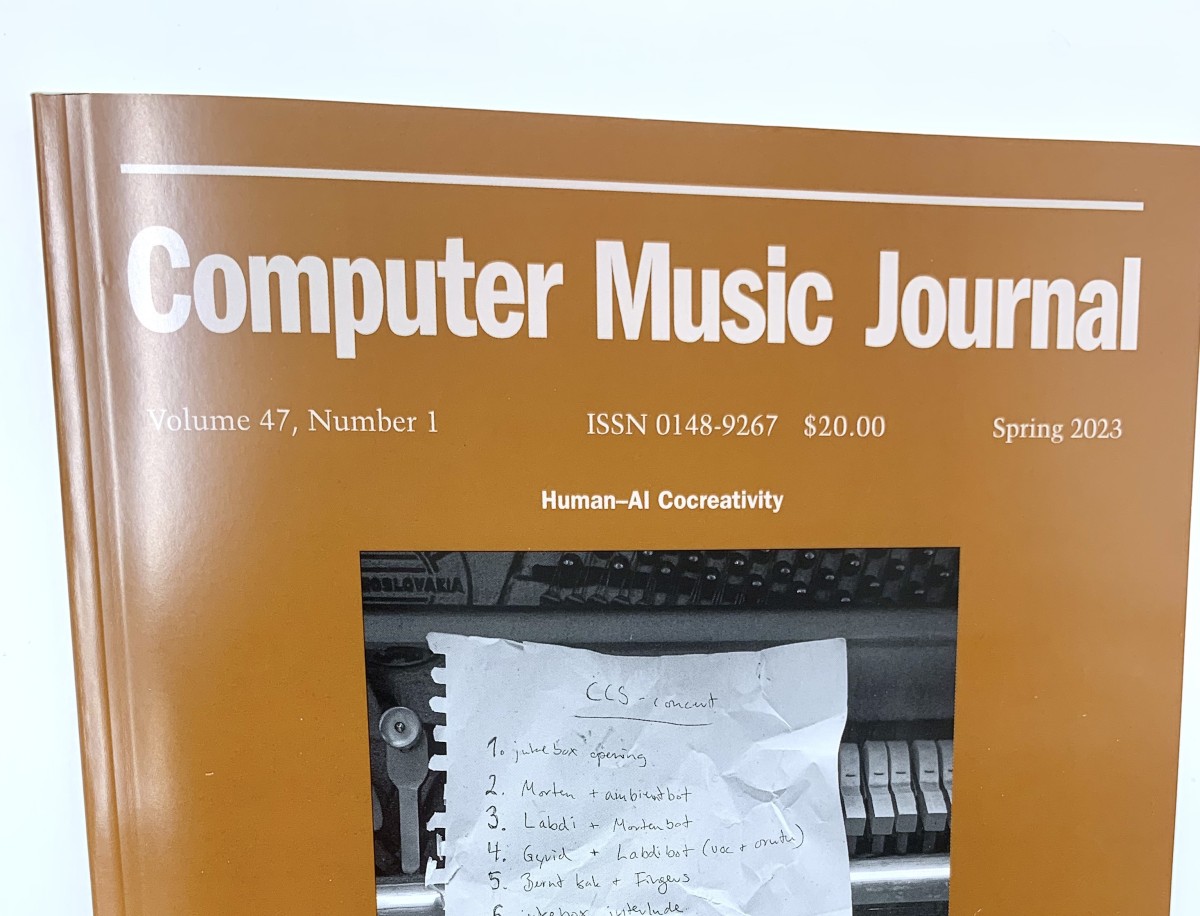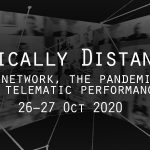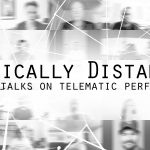Tuesday 28 July 2020, 14:00 – 19:00 CEST
Anyone can join upon registration using this online form: https://forms.gle/zzLV46NbvgqAtJ7t7
Performing live with physically distant co-performers and audiences through audio, video, and other media shared via telematic means has been part of the work of artists and researchers for several decades. Recently, the restrictions put in place to cope with the COVID-19 pandemic have required performing artists to find solutions to practice their craft while maintaining physical distance between themselves, their collaborators, and their audience. In this second edition of Physically Distant, we wish to continue discussing telematic performance from perspectives suggested by the following questions:
What are the opportunities and challenges of telematic performance?
What are the implications on how performing arts are conceived, developed, experienced?
How are research and practice being reconfigured?
How is telematic performance suggesting different understandings of the role of instruments, gesture and acoustic spaces?
How might telematic performance contribute to reconfiguring our understanding of music in societal and political perspectives?
We wish to highlight two threads from the previous discussions. First, how telematic performance can be conceived of as protest, and second, the potential for telematic performance to expand the artistic and social potential in intercultural arts. Both of these threads imply a discussion of accessibility.
Once again, the GEMM))) the Gesture Embodiment and Machines in Music research cluster at the School of Music in Piteå, Luleå University of Technology has invited a group of artists, researchers, and scholars to instigate an open, interdisciplinary discussion on these themes. The talks will happen online, on Tuesday 28 July 2020.
The sessions will be organised in 1-hour time slots. Each slot will include two 15-min presentations, the remaining time will be dedicated to questions and discussion.
We are very happy to host a telematic performance by the Female Laptop Orchestra (FLO). The practice of this group is discussed in the talks by Franziska Schroeder and Nela Brown. A presentation of the conceptual backdrop for the performance can be found below.
The structure of the event includes short breaks in between the sessions in order to avoid Zoom fatigue and allow for informal chats and continued discussion over a drink (not provided by the organisers). There will be a plenary at the end of the day, during which we will be discussing issues and opportunities that have emerged during the other sessions.
28 July 2020 schedule (all times are CEST):
- 14:00 Session 0: Introduction, results of the survey that followed Physically Distant #1
- 14:30 Session 1: Ximena Alarcon, Franziska Schroeder
- 15:30-15.50 — Performance by FLO (Female Laptop Orchestra) —
- 15.50-16.00 — 10-min Break —
- 16:00 Session 2: Nela Brown , Rebekah Wilson
- 17:00 — 30-min Break —
- 17:30 Session 3: OvO, Kaffe Matthews
- 18:30 Session 4: Plenary
- 19:00 — END —
Moderators / instigators: Federico Visi, Stefan Östersjö
Anyone can join upon registration using this online form: https://forms.gle/zzLV46NbvgqAtJ7t7
We will send you a link to join a Zoom meeting on the day of the talks.
NOTE: the talks will be recorded.
A follow up event is planned for the 2020 Piteå Performing Arts Biennial taking place online on 26-27 October 2020.
Further info: mail@federicovisi.com
Telematic performance by the Female Laptop Orchestra (FLO)
Absurdity (concept by Franziska Schroeder and Matilde Meireles)
A distributed performance using LiveSHOUT with members from the Female Laptop Orchestra (FLO).
“Absurdity” is based around a short excerpt from one of Portugal’s most mysterious, elusive and peculiar writers, Fernando Pessoa. Pessoa’s multiplicities and his ways of thinking about life, engendering ideas that can feel manic-depressive, filled with buckets of self-pity, while being able to scratch the innermost parts of one’s soul, lie at the heart of this distributed performance.
Members of FLO will stream sounds from several distributed places, including Crete, Italy, Brazil and the UK, while Franziska and Matilde will be delivering fragmented excerpts (in both English and Portuguese) alongside the LiveSHOUT streams. The idea of distributed creativity, where we combine sounds from several sites, inspired by Pessoa’s plurality of thoughts and philosophies; his multiplicities, his fictionality and his self alienation, will lead to a performance that aims to be absurd, dispersed, fragmented and multiple.
“I’ve always belonged to what isn’t where I am and to what I could never be”. (Pessoa In: Ciuraru, 2012).
The FLO performers are:
Franziska Schroeder – LiveSHOUT and Pessoa reading (English)
Matilde Meireles – LiveSHOUT and Pessoa reading (Portuguese)
Maria Mannone – LiveSHOUT streams of piano improv from Palermo
Maria Papadomanolaki – LiveSHOUT streams of sounds from Crete
Anna Xambó – LiveSHOUT streams of sounds from Sheffield
Nela Brown – LiveSHOUT streams of sounds from London
Ariane Stolfi – LiveSHOUT streams of sounds from Porto Seguro and playsound.space
Female Laptop Orchestra (FLO), a music research project established in 2014 by Nela Brown, connects female musicians, sound artists, composers, engineers and computer scientist globally, through co-located and distributed collaborative music creation. Each FLO performance is site-specific and performer-dependant, mixing location-based field recordings, live coding, acoustic instruments, voice, sound synthesis and real-time sound processing using Web Audio API’s and VR environments with audio streams arriving from different global locations (via the internet and mobile networks). From stereo to immersive 3D audio (and everything in between), FLO is pushing the boundaries of technology and experimentation within the context of ensemble improvisation and telematic collaboration.
Female Laptop Orchestra: https://femalelaptoporchestra.wordpress.com/
LiveSHOUT: http://www.socasites.qub.ac.uk/distributedlistening/liveSHOUT/
Locus Sonus soundmap: https://locusonus.org/soundmap/051/
Presenters Bios:
Ximena Alarcón Díaz is a sound artist researcher interested in listening to in-between spaces: dreams, underground public transport, and the migratory context. She creates telematic sonic improvisations using Deep Listening, and interfaces for relational listening. She has a PhD in Music, Technology and Innovation from De Montfort University (2007), and is a Deep Listening® certified tutor. Her project INTIMAL is an “embodied” physical-virtual system for relational listening in telematic sonic performance (RITMO-UiO, 2017-2019, Marie Skłodowska Curie Individual Fellowship). She is currently a Senior Tutor in the online Deep Listening certification program offered by the Center for Deep Listening (RPI), and works independently in the second phase of the INTIMAL project that involves: an “embodied” physical-virtual system to explore sense of place and presence across distant locations; and a co-creation laboratory for listening to migrations with Latin American migrant women.
http://ximenaalarcon.net
Franziska Schroeder is an improviser and Reader, based at the Sonic Arts Research Centre, Queen’s University Belfast where she mainly teaches performance and improvisation.
In 2007 she was the first AHRC Research Fellow in the Creative/Performing Arts to be awarded a 3 year grant to carry out research into virtual / network performance environments. Her writings on distributed creativity have been published by Routledge, Cambridge Scholars, and Leonardo. In 2016 she co-develop the distributed listening app LiveSHOUT.
Within her research group “Performance without Barriers”, which she founded in 2016, Franziska currently designs VR instruments with and for disabled musicians.
https://pure.qub.ac.uk/en/persons/franziska-schroeder
Rebekah Wilson is an independent researcher, technologist and composer. Originating from New Zealand she studied instrumental and electroacoustic music composition, and taught herself computer technology. In the early 2000s she held the role of artistic co-director at STEIM, Amsterdam, where her passions for music, performance and technology became fused. Since 2005 she has been co-founder and technology director for Chicago’s Source Elements, developing services that exploit the possibilities of networked sound and data for the digital sound industry while continuing to perform and lecture internationally. Holding a masters in the field of networked music performance, her current research on the topic can be found on the Latency Native forum.
https://forum.latencynative.com
Nela Brown is an award-winning Croatian sound artist, technologist, researcher and lecturer living in London, UK. She studied jazz and music production at Goldsmiths, University of London, followed by a BA (Hons) in Sonic Arts at Middlesex University London. Since graduating in 2007, she worked as a freelance composer and sound designer on award-winning international projects including theatre performances, dance, mobile, film, documentaries and interactive installations. In 2014, she started Female Laptop Orchestra (FLO). In 2019, as part of the prestigious Macgeorge Fellowship Award, she was invited to join the Faculty of Fine Arts & Music at the University of Melbourne, Australia to deliver talks and workshops about collaborative music-making, laptop orchestras and hack culture, as well a number of performances with FLO. She is currently doing a PhD in Human-Computer Interaction and lecturing at the University of Greenwich in London.
http://www.nelabrown.com/
Italian noise-rock duo OvO has been at the center of the worldwide post-rock, industrial-sludge, and avant-doom scenes for nearly two decades. Their “always-on-tour” mentality, coupled with a DIY ethic, fearless vision, and pulverizing live shows have made them the Jucifer of Europe; impossible to categorize, but always there, appearing in your hometown, like a ghostly omnipresence. OvO’s fiercely independent ethos and grinding live schedule have earned the band a significant worldwide fanbase that have come to expect nothing but the most daring and innovative dark music presentations.
OvO were on the road for their 20th anniversary European tour when the COVID-19 pandemic hit the continent. The band was forced to cancel the remaining gigs of the tour and drive back to their home country, which was suffering one of the worst health emergencies of its recent history. In the midst of the lockdown, they performed live on the stage of the Bronson club in Ravenna, Italy, and professionally live-streamed the entire concert on DICE.fm
http://ovolive.blogspot.com
Kaffe Matthews is a pioneering music maker who works live with space, data, things, and place to make new electroacoustic compositions. The physical experience of music for the maker and listener has always been central to her approach and to this end she has also invented some unique interfaces, the sonic armchair, the sonic bed and the sonic bike that not only enable new approaches to composition for makers but give immediate ways in to unfamiliar sound and music for wide ranging audience.
Kaffe has also established the collectives Music for Bodies (2006) and The Bicrophonic Research Institute (2014) where ideas and techniques are developed within a pool of coders and artists using shared and open source approaches, publishing all outcomes online.
During COVID times, Kaffe has produced new music by collaborating with other music makers through streaming platforms and has hosted live-streaming parties in her apartment in Berlin.
https://www.kaffematthews.net
Tuesday 28 July 2020, 14:00 – 19:00 CEST
Anyone can join upon registration using this online form: https://forms.gle/zzLV46NbvgqAtJ7t7





